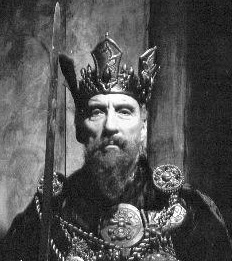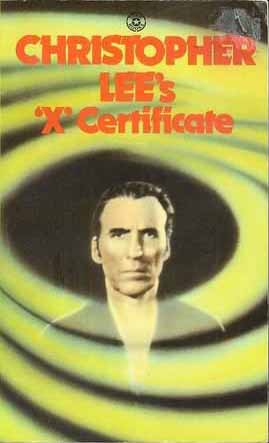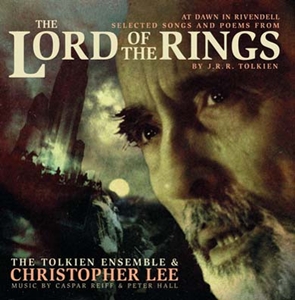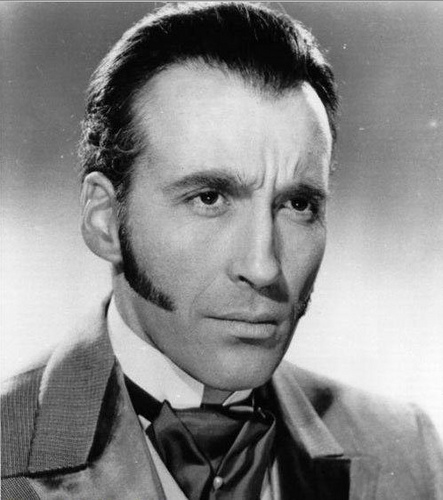Christopher Lee: Metal God (and so much more)
Wednesday, January 20, 2010
posted by Deuce Richardson
 Print This Post
Print This Post
 “…the older Christopher Lee gets, the cooler Christopher Lee gets.”
“…the older Christopher Lee gets, the cooler Christopher Lee gets.”
— Steve Tompkins, “The Voice of Saruman, Speaking the First Age Into Being”
While I’d heard whispers of a new Christopher Lee project on the Official Robert E. Howard Forum,* it was this fine blog entry by Jeff Sypeck on the Quid Plura? site which motivated me to get up off the parliamentary side o’ me arse and compose a blog entry of my own.
As it turns out, come March of this year, Sir Christopher will be speaking the Carolingian Age into being. All indications point to the project being a bit light in the “metal” department, but how does that really matter when we will all get the chance to hear the mighty deeds of Charles the Great recounted by one of his own descendants? Besides, Mr. Lee already has the metal end of the musical spectrum covered due to his stalwart contributions to the catalogs of Manowar and Rhapsody.
Lee’s audio legacy is a bit more diverse than simply lending gravitas to albums from metal bands. In the ’70s, he lent his incomparable voice to a “musical interpretation” of Dunsany’s The King of Elfland’s Daughter. A worthier project (in my opinion) was Lee’s recent appearance on a cd released by The Tolkien Ensemble entitled At Dawn in Rivendell (my personal favorite being his reading of “Warning of Winter”).
Of course, Lee’s finest hour (so far) in the audio realm is his narration of The Children of Húrin. A pity that he will not declaim Tolkien’s skaldic verses in the forthcoming audiobook version of The Legend of Sigurd and Gudrun.
Lee’s film legacy goes without saying to most readers of The Cimmerian. On top of his appearances in hundreds of films, by some reckonings the box office receipts for his films outstrip those of any other actor, living or dead. According to his own estimation, Lee has spent more time onscreen engaged in swordfights (he counts lightsabers) than any actor (take that, Flynn). All of which doesn’t count his non-sword-wielding contributions to films near and dear to the hearts of adventure-lovers like Olivier’s Hamlet as well as screen iterations of The Three Musketeers, Ivanhoe and Treasure Island. Sean Connery could only wish for a track record which boasts as many quality productions where swords hold sway.
Throughout his career, Lee’s choices of roles have marked him as an actor with a love for works in the “genre” category (a label I hate; as if “romantic comedy” or “contemporary drama” aren’t also “genres”). Horror, historical adventure, fantasy, science fiction… Christopher Lee has done them all.
Sir Christopher is conspicuous in the film community for putting his reading  glasses where his mouth is. That is, he doesn’t just act the roles he chooses but reads them as well, along with “genre” literature for its own sake. His love for Tolkien (Lee actually met the man once) is well-attested. I have no doubt that he is also a fan of Dunsany. However, how many readers of The Cimmerian know that Lee once introduced a horror collection containing Robert E. Howard’s “The Black Stone”? I have no idea if he actually chose the tales contained therein (I wouldn’t bet against it), but I’m willing to give the man props nonetheless.
glasses where his mouth is. That is, he doesn’t just act the roles he chooses but reads them as well, along with “genre” literature for its own sake. His love for Tolkien (Lee actually met the man once) is well-attested. I have no doubt that he is also a fan of Dunsany. However, how many readers of The Cimmerian know that Lee once introduced a horror collection containing Robert E. Howard’s “The Black Stone”? I have no idea if he actually chose the tales contained therein (I wouldn’t bet against it), but I’m willing to give the man props nonetheless.
Christopher Lee is a man who has lived a life most of us can only dream of. In 1939, at the age of seventeen, he volunteered (and was deployed) to fight on the side of the Finns against the onslaught of the Soviet Union. By the end of World War Two, he was serving as an operative for the Special Operations Executive. From there, it was films, books, albums and marriage to a Danish fashion model.
What strikes this blogger most about Christopher Lee (other than his talent, guts and taste) is his open-mindedness and willingness to keep exploring new realms of expression long after most “senior citizens” decide to wallow in nostalgia. Hollywood could use ten more like ‘im.
Oh yeah, I think he would’ve made the best Solomon Kane ever.
*My thanks to Lee Mark Dotson.


